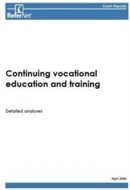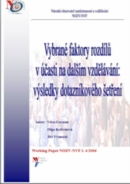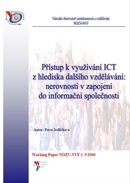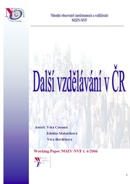

2006
Available in English:
The Competitiveness Yearbook Czech Republic 2005
The Competitiveness Yearbook of the Czech Republic has been published by two research teams - Centre for Economic Studies and National Observatory of Employment and Training. The yearbook comprises a broad range of indicators enabling a comprehensive assessment of the Czech Republic position within the enlarged EU in terms of four pillars: institutional quality, innovation performance, and human resource quality, within the framework of macroeconomic stability and performance.
Chapter Quality of Human Resources: Analysis.
Download ![]()

Continuing vocational education and training: detailed analyses. ReferNet 2006.
Report (accordingly to CEDEFOP outline for european ReferNet) enables comparison of situation in Vocational Education and Training among the EU countries.
Download ![]()
Other publications (available in Czech):
Matoušková, Z., Kofroňová, O. : Approach of Innovative Enterprises to Human Resources Development. Working Paper NOZV-NVF č. 1/2006, NOZV-NVF, 2006.
The core of the study is the analytical part which is based on a survey into innovative enterprises in the CR carried out in 2005 and 2006. Firstly, the link between the company size and type of ownership and innovation is examined, as well as the scope, importance and intensity (measured per annum) of innovative activities in relation to basic company types. Attention is paid to the characteristics of training related to the type of innovative enterprise and job positions with varying levels of skills intensity. The use of incentives to increase the employees' participation in continuing training is examined, as well as approaches to controlling the quality of the training and evaluating its outcomes/benefits, etc.
Czesaná, V., Matoušková, Z. : Participation and Barriers to Senior Citizens' Education. Working Paper NVF-NOZV č. 2/2006, NOZV-NVF, 2006.
The study analyses the extent and factors related to participation of older workers in continuing training. The starting point is a description of the existing level of qualifications and skills of older people compared with young generations. The extent and forms of participation of older age groups of the Czech population in continuing training are analysed in comparison with their European counterparts. It also analyses the link between age, sex and educational attainment. The last part of the study focuses on factors limiting interest and possibilities that older workers have in expanding their knowledge and identifies factors whose importance rises with age.
Matoušková, Z., Vymazal, J. : The Impact of Information and Communication Technologies on Vocational Training. Working Paper NVF-NOZV č. 3/2006, NOZV-NVF, 2006.
The study deals with the impact of ICT on the forms and content of education. It explores among others the degree to which households in the CR have a PC and the Internet connection - both in terms of comparison with the EU and in terms of differences between household types, locations, etc. Attention is also paid to digital literacy, which is examined with regard to the age, educational attainment and position in the labour market. Furthermore, the study deals with the use of the Internet in education and the use of PCs by teachers.

Czesaná, V., Kofroňová, O., Vymazal, J. : Chosen Factors of Differences in Vocational Training Participation: Outcomes of Questionnaire Survey. Working Paper NVF-NOZV č. 4/2006, NOZV-NVF, 2006.
The study focuses on analysing factors that have an impact on differences in participation of the adult population in continuing training. It is based on results of a questionnaire survey of individuals aged 25-64 that took place in 2005/2006 and in which data were broken down according to age, sex, education, position on the labour market, groups of professions, income and size of place of residence. Besides the extent of participation in training the survey also monitored characteristics of courses, their relation to employment and mode of their financing. Factor analysis was used to analyse causes why some adult groups did not participate in training. It identified both risk social groups not involved in continuing training and also barriers that limit their access to training.

Jedličková, P. : Approach to ICT utilization from the point of Vocational Training: Inequalities in Integration in Information Society. Working Paper NVF-NOZV č. 5/2006, NOZV-NVF, 2006.
The study deals with the underlying aspects of unequal access to information and communication technologies. It describes factors classifying individuals, groups and regions on the reverse side of the digital gap. Comparisons are made using EUROSTAT and OECD data which evaluate the position of the CR within the EU and comment on it on the background of global trends in the development of an information society.

Czesaná, V., Matoušková, Z., Havlíčková, V. : Continuing education in Czech Republic, Working Paper NOZV-NVF č. 6/2006, NOZV-NVF, 2006.
The study provides an overview of major policy documents of the Czech Republic and the European Union which deal with the development of continuing education and training as an important part of lifelong learning. The position of the CR in the EU in terms of the development of continuing education is assessed based on the relevant indicators. There is also an analysis of the population's education structure, language and ICT skills, and an analysis of the participation of adult population in various forms of continuing education.
Czesaná, V., Havlíčková, V., Šímová, Z. : Support of Senior Citizens' Education. Working Paper NVF-NOZV č. 7/2006, NOZV-NVF, 2006.
The aim of the study is to assess different approaches to support older workers´ training as a precondition for preserving their employability in the labour market. There is an overview and evaluation of current conditions in the Czech Republic creating both legal framework and programme support for further education and training of adult population, especially older workers. Special attention is paid to policy support and levers that have been implemented in foreign countries including description of good examples. The final part of the study outlines the possible ways and tools that could be implemented in the CR for system support of older workers, especially financial and non-financial tools influencing individuals, employers as well as training providers. Each potential policy tool is assessed as concerning possible odds and drawbacks.
Forecasting of Future Skill Needs in Energy Industry 2007-2011. Working Paper NOZV-NVF č. 8/2006, NOZV-NVF, 2006.
The aim of the survey "Forecasting of Future Skill Needs in Energy Industry 2007-2011" is to provide an overview of future development of the NACE 40 sector and some coherent sectors and to describe key factors that may influence it. In particular, the survey examines the im-pacts on human resource development and changes in future skill needs in sector and includes the recommendations for VET system as well. Because of long investment horizon in energy industry, medium term forecasts till 2025 are also considered.
Kadeřábková, A. : Structural Characteristics of Competitiveness of The Czech Economy. Working Paper NOZV-NVF č. 9/2006, NOZV-NVF, 2006.
The paper stresses the importance of structural characteristics for long-term sustainable competitiveness and is making use of them to evaluate the position of the CR within the EU. At first the assessment is based on the set of structural (Lisbon) indicators in R&D and innovation. The paper presents a comprehensive overview of knowledge-based competitiveness, assesses the economic performance and institutional governance as enabling factors to increasing level of knowledge pillars, which include innovation performance, human resource quality and information and communication infrastructure. Specific attention has focused on the industry and region-specific features of competitiveness.
Komárek, P. : Development Opportunities for Czech Innovative Enterprises in Conditions of Global Economy: Working Paper for the Project "Knowledge Society - Human Resources Qualifiactaion and Vocational Training Needs". Praha, NOZV-NVF 2006.


